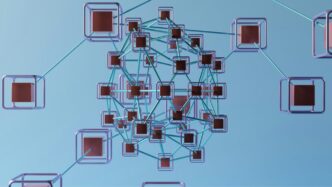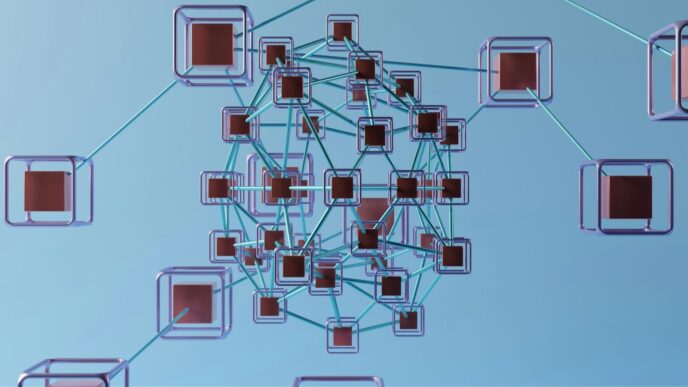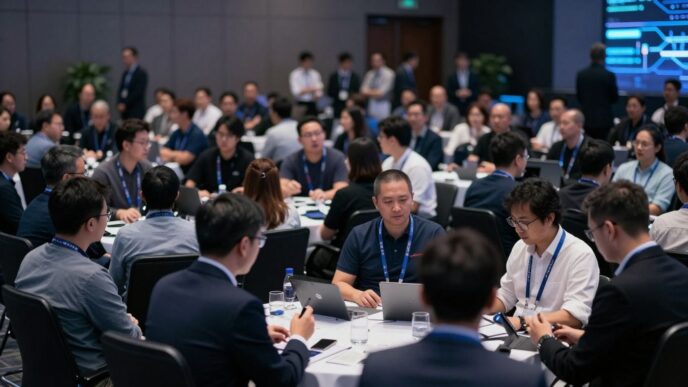The Transformative Power Of DevOps And AI

It feels like just yesterday we were talking about how DevOps was changing the game for software development. Now, we’re seeing another big shift happening, and it’s all thanks to Artificial Intelligence (AI). Think of it like this: DevOps already made things faster and smoother, but AI is like adding a turbocharger to that engine. It’s not just about doing things quicker; it’s about doing them smarter and with fewer headaches.
Accelerating Software Delivery With AI-Driven Automation
Remember those endless hours spent on repetitive tasks? AI is stepping in to handle a lot of that. It can automate things like code reviews, testing, and even deployment processes. This means your team can spend less time on busywork and more time on actually building cool new features. AI can analyze vast amounts of data from your development process to spot potential bottlenecks before they even become a problem. This proactive approach helps get software out the door much faster.
Enhancing Code Quality And Security Through Intelligent Analysis
Writing perfect code every single time is tough, right? AI tools are getting really good at catching errors and security flaws that might slip past human eyes. They can scan code for vulnerabilities, suggest fixes, and even help enforce coding standards. This leads to more reliable software and fewer security scares down the line. It’s like having an extra pair of super-powered eyes on your code.
Streamlining Workflows For Unprecedented Efficiency
When you combine DevOps practices with AI, the result is a workflow that’s incredibly efficient. AI can help teams make better decisions by providing insights from all the data generated during development. It can predict issues, optimize resource allocation, and generally make the whole process run more smoothly. This means less wasted effort and a more productive team overall.
Integrating AI Into The DevOps Lifecycle
So, you’ve heard about AI and DevOps working together, and it sounds pretty cool, right? But how do you actually make it happen? It’s not just about plugging in some new software and hoping for the best. You’ve got to be a bit strategic about it. Think of it like adding a new ingredient to a recipe – you don’t just toss it in; you figure out where it fits best to make the whole dish better.
Evaluating Current Practices For AI Opportunities
Before you even think about picking out AI tools, take a good look at what you’re doing now. Where are the bottlenecks? What tasks take up way too much time? Are there areas where mistakes happen more often than they should? This is where AI can really step in. It’s about finding those specific spots in your current workflow where a smart bit of automation or some data analysis could make a real difference. Maybe it’s spotting potential bugs before they even get to testing, or perhaps it’s figuring out the best way to allocate your cloud resources. Pinpointing these areas is the first, and maybe most important, step to making AI integration work for you.
Establishing Clear Objectives For AI Integration
Once you know where you want to apply AI, you need to set some goals. What do you actually want to achieve? Do you want to speed up your release cycles by, say, 20%? Or maybe reduce the number of critical bugs found in production by half? Having clear, measurable goals helps you track progress and know if your AI efforts are actually paying off. Without them, it’s easy to get lost and wonder if you’re just adding complexity for no good reason. It’s like setting out on a road trip without a destination – you’ll just end up driving around.
Selecting The Right AI Tools For Your Needs
Now for the fun part: picking the tools. This can feel a bit overwhelming with so many options out there. You need to think about what fits your specific goals and your existing setup. Consider things like:
- Ease of Integration: How well does this tool play with your current CI/CD pipelines, monitoring systems, and other software?
- Scalability: Can this tool grow with your team and your projects, or will you outgrow it quickly?
- Support and Community: Is there good documentation? A helpful community? What happens if you run into a problem?
- Cost: Does it fit your budget, not just for the initial purchase but for ongoing maintenance and potential cloud usage?
Don’t just grab the shiniest new thing. Do your homework, maybe even try out a few options with a small pilot project. Getting this right means the AI will actually help your team, not become another headache to manage.
Key AI Technologies Driving DevOps Innovation
AI isn’t just a buzzword anymore; it’s actively changing how we build and manage software. When we talk about AI in DevOps, we’re really looking at specific technologies that make things faster, smarter, and more reliable. Think of it as giving your development team a super-powered assistant.
Machine Learning For Predictive Analytics
One of the biggest wins AI brings to the table is its ability to look into the future, or at least, predict it. Machine learning (ML) algorithms can sift through mountains of data from your systems – logs, performance metrics, past incidents – and spot patterns. This allows teams to anticipate problems before they even happen. Instead of waiting for a server to crash or an application to slow down, ML can flag potential issues. This means less firefighting and more proactive maintenance.
Here’s a look at what ML can help predict:
- System Failures: Identifying early signs of hardware or software issues that could lead to downtime.
- Performance Bottlenecks: Pinpointing areas where applications might slow down under load.
- Security Threats: Detecting unusual activity that might indicate a breach attempt.
- Resource Needs: Forecasting when more computing power or storage will be required.
Generative AI’s Role In Code And Infrastructure
Generative AI is the new kid on the block, and it’s making waves. Tools powered by generative AI can actually create content, and in our world, that means code, documentation, and even infrastructure configurations. Imagine an AI assistant that can write boilerplate code for you, suggest fixes for bugs, or even draft initial versions of your infrastructure-as-code scripts. This doesn’t replace developers, but it certainly speeds up the process and handles some of the more repetitive tasks.
- Code Generation: Writing repetitive code snippets or even entire functions based on prompts.
- Test Case Creation: Automatically generating test scenarios to improve code coverage.
- Documentation Assistance: Drafting release notes or API documentation.
- Infrastructure Templating: Creating initial configurations for cloud environments.
AI-Powered Automation In CI/CD Pipelines
Continuous Integration and Continuous Deployment (CI/CD) pipelines are the backbone of modern software delivery. AI can make these pipelines even more intelligent. Think about automated testing – AI can help prioritize tests, identify flaky tests, and even suggest fixes for test failures. In the deployment phase, AI can analyze the risk of a new release based on code changes and historical data, helping decide if and when to push it live. It can also monitor deployments in real-time, automatically rolling back if issues arise.
AI’s impact on CI/CD includes:
- Smarter Testing: Optimizing test suites and identifying defects more effectively.
- Intelligent Deployments: Assessing release risks and automating rollback procedures.
- Automated Issue Resolution: Analyzing build failures and suggesting or even applying fixes.
- Performance Monitoring: Continuously tracking application health post-deployment.
Benefits Of Embracing DevOps And AI Synergy
So, what’s the big deal when you mix DevOps and AI? It’s not just about having fancy new tools; it’s about making things work a whole lot better. Think of it like upgrading from a basic toolkit to a professional workshop – suddenly, you can do so much more, and do it faster.
Improved Decision-Making Through Data Insights
This is a pretty big one. AI is amazing at sifting through mountains of data that we humans would just get lost in. During software development, there’s a ton of information generated – logs, performance metrics, user feedback, you name it. AI can spot patterns and trends in all that noise that we might miss. This means teams can make smarter choices about how to improve their processes, where to put their resources, and even predict potential problems before they actually happen. It’s like having a crystal ball, but it’s based on actual data, not magic.
Faster Time-To-Market For New Features
Nobody likes waiting around for new software updates or features, right? When you combine DevOps practices with AI, a lot of the repetitive, manual work gets automated. AI can speed up things like testing, code reviews, and even deployment. This means your team can get new ideas and improvements out to your users much quicker. In today’s fast-paced world, being able to react to market changes or customer needs rapidly is a huge advantage. It helps you stay ahead of the competition.
Reduced Costs And Increased Productivity
When tasks are automated and processes are streamlined, people can focus on the more creative and complex parts of their jobs. This naturally leads to increased productivity. Plus, by catching issues early with AI analysis and optimizing resource allocation, you can cut down on wasted time and money. Fewer errors mean fewer costly fixes down the line. It’s a win-win: your team gets more done, and the company saves money.
Enhanced Software Quality And Reliability
AI can do some pretty impressive things when it comes to code. It can help developers write better code from the start, identify potential bugs or security vulnerabilities before they even make it into production, and even help ensure that your software meets all the necessary compliance standards. This means the software you release is not only delivered faster but is also more stable, secure, and dependable. Less downtime and fewer frustrated users are definitely good things.
Navigating Challenges In AI-Powered DevOps

So, we’ve talked a lot about how cool AI is for DevOps, right? It speeds things up, makes code better, and generally makes life easier. But, like anything new and powerful, it’s not all smooth sailing. There are definitely some bumps in the road we need to be aware of.
Ensuring Security and Compliance Of AI Systems
This is a big one. When you bring AI into your development pipeline, you’re introducing new systems that need to be protected. Think about it: AI models can be targets for attacks, and if they get compromised, it could mess with your code, your deployments, or even sensitive data. We need to make sure these AI tools are locked down tight. This means checking out their security features and making sure they play nice with all the rules and regulations we have to follow. It’s not just about keeping hackers out; it’s about making sure our AI isn’t accidentally breaking any laws or company policies.
The Importance Of Data Quality For AI Success
AI runs on data. If the data you feed it is garbage, the AI’s output will be garbage too. This is especially true in DevOps where you’ve got tons of logs, metrics, and code changes flying around. If that data isn’t clean, accurate, and well-organized, your AI might start making bad predictions or automating the wrong things. Imagine an AI flagging a perfectly good piece of code as a bug just because the training data was messed up. That’s why having good data management practices, like making sure data is consistent and correct, is super important before you even start training your AI models.
Maintaining Human Oversight In Automated Processes
While the goal is often more automation, we can’t just switch off our brains entirely. AI is a tool, and like any tool, it needs a human to guide it. There will be times when the AI makes a mistake, or when a situation comes up that the AI hasn’t been trained for. We need to keep people in the loop to catch these issues, make final decisions, and provide that common sense that AI currently lacks. It’s about finding that sweet spot where AI handles the repetitive stuff, and humans handle the complex thinking and final checks. It’s a partnership, not a replacement.
The Future Landscape Of AI In DevOps
So, what’s next for AI and DevOps? It’s pretty exciting, honestly. We’re looking at a future where AI isn’t just helping out; it’s practically running the show in many ways. Think about it: more and more tasks that used to take up a ton of human time will just… happen. AI is going to get even better at spotting problems before they even show up on anyone’s radar. It’s like having a super-smart assistant who knows your system inside and out.
Enhanced Automation and Reduced Human Intervention
This is a big one. AI is going to take over a lot of the repetitive stuff. We’re talking about automated testing that’s smarter, code reviews that are faster and more thorough, and even infrastructure management that adjusts itself. The goal isn’t to replace people, but to free them up from the grunt work so they can focus on the really creative and strategic parts of their jobs. Imagine spending less time debugging and more time designing new features.
Proactive Problem-Solving With Advanced Analytics
Remember how we talked about AI predicting issues? That’s going to get way more sophisticated. AI will analyze massive amounts of data from your systems, not just to see what’s happening now, but to predict what might happen. This means teams can fix things before they break, leading to much more stable software and happier users. It’s a shift from reacting to problems to preventing them altogether.
Deeper Integration Into Development Tools
AI isn’t going to be a separate thing you bolt on anymore. It’s going to be woven directly into the tools developers and operations teams use every day. Think AI assistants built right into your code editor, helping you write better code faster, or AI that automatically updates documentation based on code changes. This makes using AI feel natural, not like an extra step.
Continuous Improvement Driven By AI Insights
Finally, AI will be the engine for constant improvement. By looking at how everything is working, AI can suggest ways to make processes better, faster, and more efficient. It’s a feedback loop where AI learns from what’s happening and helps the team optimize everything, from the initial code commit all the way to the software running in production. This means software development will just keep getting better over time, all thanks to smart insights from AI.
Wrapping It Up
So, we’ve talked a lot about how AI is really changing the game for DevOps. It’s not just about making things faster, though that’s a big part of it. AI helps teams catch problems early, makes sure code is better, and even helps with security. It’s like having a super-smart assistant that can handle a lot of the grunt work, letting people focus on the more creative stuff. As AI keeps getting better, especially things like generative AI, we’re going to see even more changes. It’s pretty exciting to think about where this is all heading, but one thing’s for sure: if you’re in software development, getting a handle on AI and DevOps together is going to be key to staying competitive.














